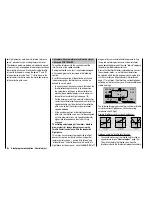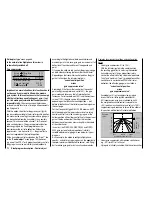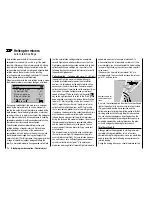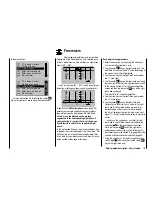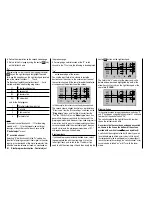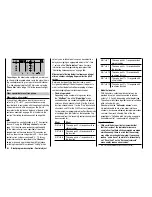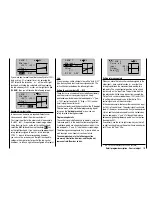
172
Detail program description - Control adjust
"
Helicopter type
" menu, page 86.
In the auto-rotation fl ight phase this mixer is
automatically switched off.
Gyro suppression
0%
0%
SEL
Nick
Throttle
0%
0°
Nick
Tail
Swash rotation
Swash limiter
OFF
Nor mal
Gyro suppress
Important: in normal situations, this function should
not be used if your model is fi tted with a modern
gyro system.
In this context, ensure that you comply
with the instructions on adjusting your gyro: if not,
you risk making adjustments that render your heli
impossible to fl y.
This menu has nonetheless been
retained in order to cater to a full range of requirements
and fl ying habits.
With this option, the effect of the gyro sensor ("gyro")
can be varied according to the tail rotor joystick position;
this assumes the use of a gyro system whose gyro gain
can be controlled from the transmitter via an auxiliary
channel. This channel will be channel 7 for Graupner
radio control systems. The gyro suppression function
reduces gyro gain in a linear progression as the
pilot increases the tail rotor defl ection. Without gyro
suppression – i.e. when set to 0% – the gyro effect is
constant, regardless of the joystick position.
With a transmitter control assigned on the "Gyro 7" line
on the "
Control adjust
" menu (page 103), however,
e. g. one of the CTRL 7 or 8 proportional rotary controls,
the gyro gain can also be infi nitely varied (optionally
according to the fl ight phase) between minimum and
maximum gain. In this case, gyro gain is maximum at full
defl ection of the slider, and zero at the opposite end-
point.
Of course, the software lets you limit the gyro gain range
on both sides by altering the transmitter control travel.
Depending on the transmitter control position, the gyro
gain at full travel on the tail rotor joystick is:
"current control position
minus
gyro suppression value".
Accordingly, if the transmitter control is at the neutral
point, and gyro suppression is set to 100%, the gyro
gain is reduced to zero as the tail rotor defl ection
increases. For values between 100% and the maximum
value of 199%, the gyro can be fully suppressed –
depending on the transmitter control position – well
before full defl ection of the tail rotor; see the diagram on
the next page.
For the
Graupner/JR
gyro NEJ-120 BB, order no.
3277
,
both the upper and the lower values are set via rotary
controls: control 1 sets the
minimum
gyro gain at the
bottom
position of the slider; control 2 sets the
maximum
gain at the
top
end-point of the slider; the transition
between these two values occurs roughly in the middle
of the slider travel.
In contrast, the PIEZO 900, PIEZO 2000 and PIEZO
3000 gyro systems feature proportional, infi nitely
variable adjustment of gyro gain; see below for typical
diagrams.
As an example, the option to confi gure fl ight phase-
specifi c – and static – gyro gain gives you the opportunity
to exploit maximum stabilization for normal, slow fl ying,
but to reduce gyro gain for fast circuits and aerobatics.
Samples of various gyro settings and confi guration
notes
Linear gyro suppression: 0% to 199%.
•
With the tail rotor joystick in the center position,
the resulting gyro effect is set using the selected
transmitter control. Using a proportional rotary
control, the effect is infi nitely variable between zero
("min") and maximum ("max"), provided transmitter
control travel is not restricted. With full tail rotor
defl ection, the effective gyro gain is as follows:
"current control position
minus
gyro suppression value".
Accordingly: at 0% gyro suppression, gyro gain
is constant for tail rotor joystick movement; at
50% suppression, gyro gain is reduced to half if
the assigned transmitter control is moved to the
+50% position (as shown here); and only at >150%
suppression is gain reduced to zero with the slider at
this position, well before full tail rotor defl ection.
Exemple:
+50 %
Í
Gyro gain
Î
left
Stick deflection tail rotor
centre
right
Range of
tr
ansmitter
control 7
Linear gyro suppression with reduced control travel,
•
e. g. -50% to +80% of full travel.
Gyro gain is infi nitely variable within these transmitter
Summary of Contents for mx-20 Hott
Page 41: ...41 Your notes...
Page 49: ...49 Your notes...
Page 55: ...55 Your notes...
Page 81: ...81 Your notes...
Page 85: ...85 Your notes...
Page 89: ...89 Your notes...
Page 99: ...99 Detail program description Control adjust...
Page 127: ...127 Detail program description Control adjust...
Page 131: ...131 Detail program description Control adjust...
Page 163: ...163 Detail program description Control adjust...
Page 191: ...191 Detail program description Control adjust...
Page 207: ...207 Detail program description Control adjust...
Page 228: ...228 Detail program description Control adjust...
Page 229: ...229 Detail program description Control adjust...
Page 251: ...251 Detail program description Control adjust...











